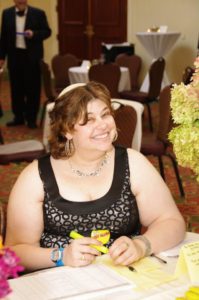My Kippah, Myself
I turn heads.
I say this with no small amount of modesty, but I know it to be true. It’s not my bold fashion choices or the streaks of blue and green in my hair that cause people to stare. No, the thing about me that draws the most attention is my kippah.
It’s been over 20 years, since fourth grade, that I’ve been wearing a kippah consistently. I wish the story were more exciting. I wish it had been a moment of revolution, when the spirit of egalitarianism took hold in my young heart and I refused to ignore its clarion call. It didn’t exactly happen that way. What did happen? It was pretty simple: my parents came home with a present. It was purple and sparkly, and I was nine. And beyond that, it was even simpler: Jewish people wear kippot. I’m Jewish. QED.
And since then, but for the public-school years, it’s been an ongoing motif in my life. After years at a day school, starting public school in seventh grade was difficult enough; add the Hebrew name to the mix and…well, even the strongest identity would be hard-pressed to stand up to that. But during summers at Camp Ramah, at USY kinnusim, and always at shul, my kippah was there. And when I began college at the University of Judaism (now the American Jewish University), en route to a life as a Jewish professional, it came back to stay.
Since then I’ve learned which hairstyles work best with a kippah and the style of clip that attaches best to my head. I’ve learned to keep my head up during spontaneous lectures from strangers, to smile kindly when a small child gets frightened, and to nod politely when someone tells me they’ve never seen a woman in a kippah before. I smile and wave at people who point at me.
I don’t wear a kippah in order to spark conversations, but many people take it that way. Interestingly, in my hometown of Omaha, Nebraska, nobody so much as batted an eyelash. In New York City, where I live now, I get many more reactions. And because it’s New York City, most people have no compunction about striking up a discussion.
One night on the subway, an old man in a black hat asked me who told me it was okay to wear a kippah (looking shocked when I replied, “my rabbis and teachers”), and then asked if I was Jewish. Later, of course, I came up with all sorts of zingers: “Oh, this? I thought it would be a great way to cover my bald spot!” “Gosh, I’m glad you didn’t see me with tefillin marks!” “No hablo ingles.”
But all these reactions diminish the seriousness of my truth. The truth is that I believe in a God in whose image we are created, and that my connection to God pushes me to cover my head. It’s that simple, and that complex. It’s my favorite explanation for why Jews wear kippot – just like indentured servants in Rome who covered their heads to show that they were living a life of service, we cover our heads to show that we live in service to God. And when I’m not wearing a kippah, I feel different. This is who I am.
Unfortunately, the man on the subway was one of a long line of fellow Jews offering me their unsolicited opinions or unwanted attention. A woman at the grocery store told me I was disrespecting God. My fifth-grade classmate took my kippah clips when I was scratching my head. One dad explained to his kids that sometimes men wear dresses. And one couple pointed and stared at me through the window as though I couldn’t see them. If I weren’t constrained by my ingrained politeness, this is what I would tell them:
My kippah is not about you any more than the rest of the way I present myself is about you. My kippah is about me, it’s about God. It’s about Judaism and family and tradition. You are not the official arbiter of what Judaism is or is not. I do not require your understanding or your approval; however, respect is appreciated. If you’ve got honest questions, ask away – but if you plan to lecture or yell, please just walk on by.
And if you keep gawking at me, your face will freeze like that.
Gila Drazen is the communications associate at the United Synagogue of Conservative Judaism.


